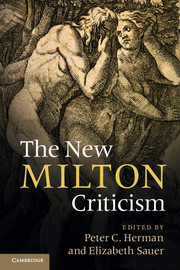Book contents
- Frontmatter
- Contents
- Notes on contributors
- Acknowledgments
- Note on editions
- Introduction Paradigms lost, paradigms found: the New Milton Criticism
- Part I Theodicies
- Chapter 1 Milton’s fetters, or, why Eden is better than Heaven
- Chapter 2 “Whose fault, whose but his own?”
- Chapter 3 The political theology of Milton’s Heaven
- Chapter 4 Meanwhile: (un)making time in Paradise Lost
- Chapter 5 The Gnostic Milton: salvation and divine similitude in Paradise Regained
- Chapter 6 Discontents with the Drama of Regeneration
- Part II Critical receptions
- Index
- References
Chapter 6 - Discontents with the Drama of Regeneration
Published online by Cambridge University Press: 05 June 2012
- Frontmatter
- Contents
- Notes on contributors
- Acknowledgments
- Note on editions
- Introduction Paradigms lost, paradigms found: the New Milton Criticism
- Part I Theodicies
- Chapter 1 Milton’s fetters, or, why Eden is better than Heaven
- Chapter 2 “Whose fault, whose but his own?”
- Chapter 3 The political theology of Milton’s Heaven
- Chapter 4 Meanwhile: (un)making time in Paradise Lost
- Chapter 5 The Gnostic Milton: salvation and divine similitude in Paradise Regained
- Chapter 6 Discontents with the Drama of Regeneration
- Part II Critical receptions
- Index
- References
Summary
Poetry often is written to expand th[e] horizon of expectation.
Wittreich, Interpreting “Samson Agonistes” (1986)“I do not know who invented” the term, William Empson confesses, and it is far from an indictment of Christianity at large, but “‘Neo-Christian’ seems the right way to describe those recent literary critics, some of whom believe in Christianity and some not, who interpret any literary work they admire by finding in it a supposed Christian tradition.” The “supposed Christian tradition” is one of the hermeneutic lenses through which literary works have been read into conformity or coherence, and one of the paradigms applied in resolving uncertainties in Milton’s works. Empson and Christopher Hill – both of whom John P. Rumrich names as opponents of a unifying imperative Milton scholarship – credited C. S. Lewis with leading the charge to “‘annex Milton’ on behalf of orthodoxy.” Milton’s poetry best lends itself, Lewis had decided, to readings by those who can be counted among Milton’s fit (traditional Christian) readers. Lewis himself is a case in point: “I should warn the reader,” cautions Lewis, “that I myself am a Christian, and [believe] that … the atheist reader must ‘try to feel as if he believed’ … But for the student of Milton my Christianity is an advantage. What would you not give to have a real, live Epicurean at your elbow while reading Lucretius?” In an essay on “Milton and the Cult of Conformity,” Joseph H. Summers tellingly remarked on the critical practice of reading literature into conformity by “reduc[ing] an admired figure to [the critic’s] own image.” Lewis’s influential scholarship reinforced the identification of Milton with moral and Christian orthodoxy, a practice also complemented by the methodological prudence of the New Critics in particular. Lewis became a most formidable contestant for other key Miltonists like Empson in scholarly controversies on Milton’s theodicy, Christianity, and poetics. Upon entering the debate from outside the discipline, Marxist historian Christopher Hill cast Milton as “a radical Protestant heretic” in opposition to the revisionist movement in British historiography and the religious conservatism he discerned in Milton studies. For Hill, the works of Milton’s right and left hands testified to Milton’s dissenting position.
- Type
- Chapter
- Information
- The New Milton Criticism , pp. 120 - 136Publisher: Cambridge University PressPrint publication year: 2012
References
- 1
- Cited by



